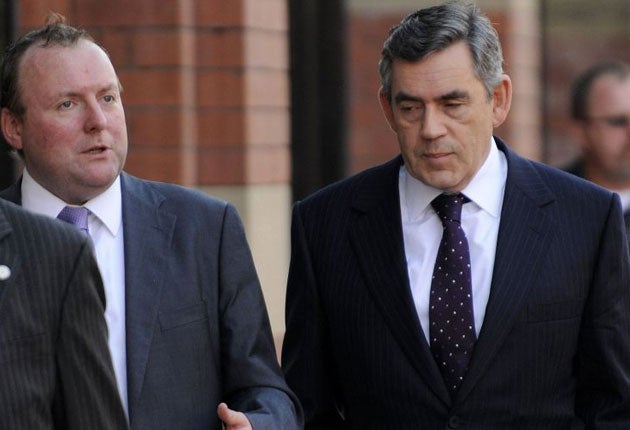Andy McSmith: I warned them that McBride was bad news
Andy McSmith recalls his dealings with the man who has plunged Labour into crisis

Warning signs that the political career of Damian McBride could end in disaster were already up and lit before he and his employer took up residence in 10 Downing Street.
His attack-dog style, blunt language, and fondness for drinking and talking late into the night were signs of a man who lacked the caution of a career civil servant.
McBride is a man of parts. When I dealt with him professionally, I was always impressed by how quickly and succinctly he replied to queries. And yet, though I do not normally consider it my business to intervene in the political process, I did attempt two years ago to convey a message to Gordon Brown, through one of his trustees, that it would be unwise to move McBride from the Treasury to the highly exposed position of official spokesman for the Prime Minister.
Even then, he had too much of a reputation for enjoying drinking late into the night with journalists. People in these exposed positions can drink with journalists if they must, but should never, ever, enjoy it. Gathering and passing on political intelligence is a duty that people around the Prime Minister have to perform. It is not a game to be played for fun.
McBride, who is only 34, was too obviously hooked on the game. He was still in his 20s when Brown raised him to the position of Director of Communications for the Treasury in 2003. In that post, he was meant to be bound by the rules that ban civil servants from engaging in party politics, but McBride took a pretty liberal view of what he was permitted to say and do in the service of Gordon Brown.
In 2005, when his partisan behaviour was causing older and wiser civil servants to question his suitability, his job description was altered to "special adviser", meaning that he continued to draw a civil service salary, but was free from the rules about political impartiality.
Anthony Browne, now head of policy in Boris Johnson's private office of London's Mayor, was one of the first to experience how McBride made use of this freedom. Browne was working as a journalist at The Times, but was shortly to head off to run a Conservative think-tank, when he submitted a question to the Treasury about how pension funds had been affected by changes in the tax system.
McBride's reply, by text message, was: "I just wish for once you'd try to get past your cynical, Tory, half-wit Harold Lloyd schtick to try and be a genuine journalist. It's presumably cos of your inability to do so that you're off to earn a crust at some Tory think-tank instead. Pathetic."
Guido Fawkes, the blogger who revealed the emails that ended McBride's career, told another damaging story about him three years ago, though this was never substantiated. McBride was allegedly overheard in a London pub telling David Cracknell, the political editor of The Sunday Times, that there were plans afoot to remove John Prescott as deputy prime minister and to appoint David Miliband in his place. Whether or not McBride planted that tale, it duly turned up in The Sunday Times.
Though stories like these do no great credit to the reputation of politics, they contain a clue as to why Gordon Brown retained this adviser who has so spectacularly dropped him in it. McBride was devoted to the job. He was on call 24 hours day – a quality much appreciated by Brown, who is himself never off duty. He was utterly loyal to Brown, and, unlike most people who work for the Labour Party, he had good relations with Tory newspapers, such as The Sunday Times, the Daily Mail and The Daily Telegraph. Even Anthony Browne, despite that bruising text message, thought he was a high-quality professional operator. "He is what he is – a colourful character, and life would be poorer without colourful characters," he said yesterday.
The trouble is that high-level politics these days practically excludes anyone who is not an obsessive. Anybody who spent just part of their life in the company of people outside politics would see at once what an appalling thing it is to be sitting in an office in Downing Street, using a government email account to purvey tittle-tattle about the emotional state of a woman whose only offence is to be married to a rival politician.
But for some of the obsessives caught up in the glitzy excitement of life at the centre, it is all about playing the game for its own sake, and any sense of proportion, any sense of how your behaviour looks to those on the outside, is lost.
Subscribe to Independent Premium to bookmark this article
Want to bookmark your favourite articles and stories to read or reference later? Start your Independent Premium subscription today.

Join our commenting forum
Join thought-provoking conversations, follow other Independent readers and see their replies